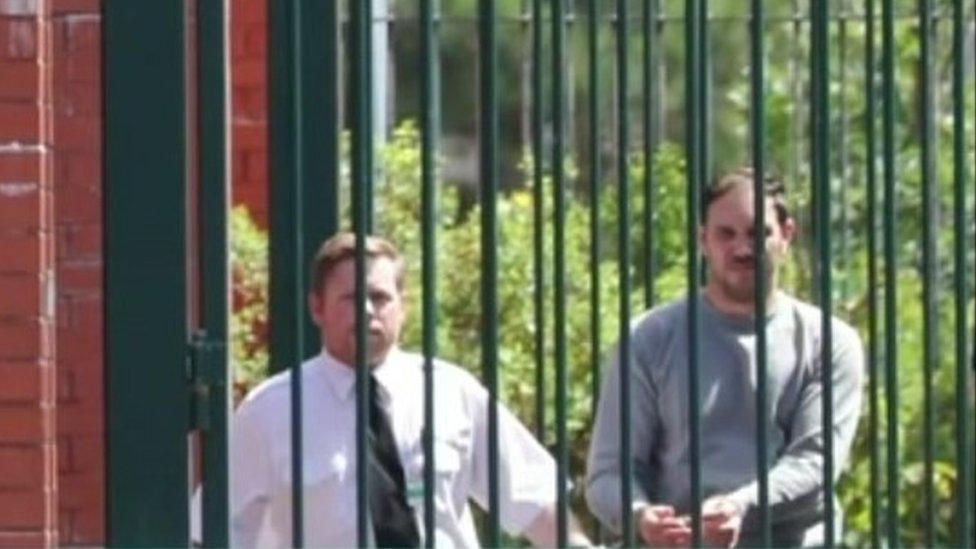Gerald Corrigan 'shot with crossbow' while fixing satellite dish
- Published
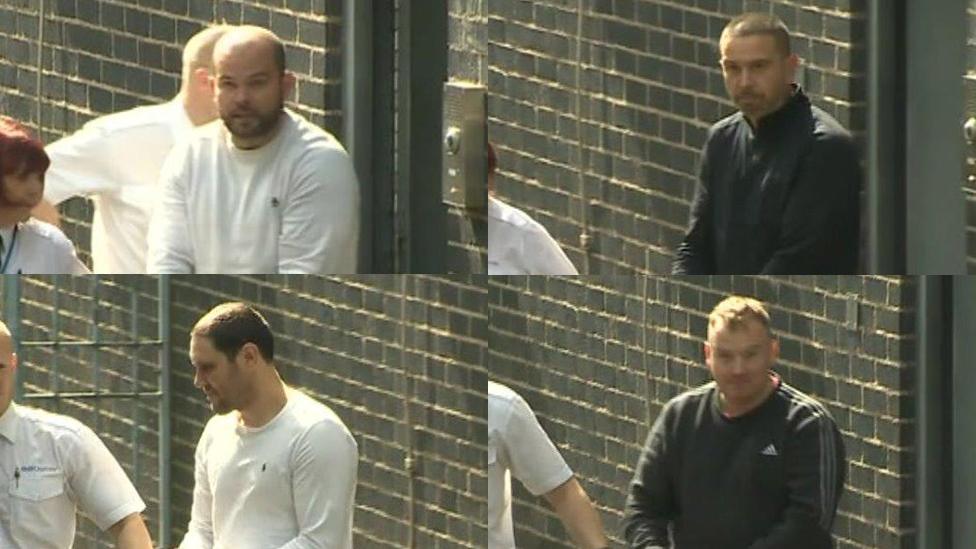
Gavin Jones, Darren Jones, Martin Roberts and Terence Whall have denied the charges
A 74-year-old man was "callously" shot with a crossbow after going outside in the dark to fix his satellite dish, a murder trial has heard.
Mold Crown Court heard someone was hiding "probably behind a wall" armed with the "silent, quick and deadly weapon", waiting for Gerald Corrigan.
He died three weeks after the 19 April shooting at his remote Anglesey home.
Terence Whall, 39, denies murder, telling police he was in a nearby field having a sexual encounter with a man.
He also denies a charge of perverting the course of justice, along with three others, amid allegations they conspired together to set fire to a vehicle later found burnt out.
The other three - Martin Roberts, 34, of James Street in Bangor, Darren Jones, 41, of the Bryn Ogwen estate at Penrhosgarnedd and Gavin Jones, 36, of High Street, Bangor - also deny the charges.
Jurors heard Mr Corrigan lived with his 64-year-old partner Marie Bailey, who had multiple sclerosis, and that he was in effect her carer.
They lived at Gof Du, situated in about 30 acres near South Stack, close to the coastal path.
"It isn't a place that you could simply pass by - to go there, you had to intend to go there," prosecution barrister Peter Rouch QC said.
According to details retained by Sky, at about midnight Mr Corrigan was watching a recorded programme.
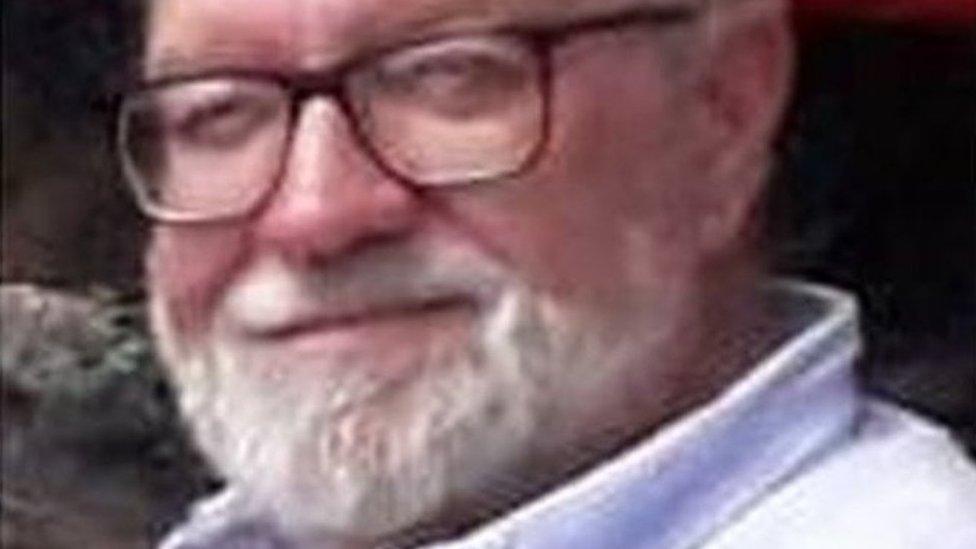
Gerald Corrigan died three weeks after being shot outside his Anglesey home
Some time between 00:08 and 00:28 BST, the Sky signal was interrupted and Mr Corrigan went outside to look at the dish.
The court heard the outside security lights had not worked for the best part of 18 months.
The prosecutor said: "He must have bent over the Sky dish, with his right hand resting on the house wall. This must have occurred within a minute or so before 12:30am.
"He felt a terrible pain to his body and thought that somehow he had been electrocuted by the Sky dish.
"He suddenly had a bleeding and broken arm, which he thought was part of the electrocution," he explained.
The court heard the bolt entered his left hand side, passing completely through his body, cutting his spleen and penetrating his large intestine and stomach.
It also caused damage to his gastric artery, penetrated his liver, colon and diaphragm, and bruised his heart, before exiting his body more or less through his right chest.
'Heart attack'
"So silent and quick is a crossbow that Mr Corrigan had no idea what had happened to him. All he knew was that he was in terrible pain," Mr Rouch said.
"He went back into the house and shouted loudly for his partner, managed to walk up the stairs, where she saw he was in lots of pain, bleeding heavily from his arm and was very frightened.
"Mr Corrigan said he thought he had been electrocuted by the Sky dish, and thought he was having a heart attack," he said.
Jurors heard a paramedic using a torch noticed the gate to a neighbouring field was open and also found an arrow on the grass which appeared to be covered in blood.
Mr Corrigan received emergency surgery at Ysbyty Gwynedd in Bangor, which included the removal of his spleen and surgical repairs to the damage to his colon and stomach, and was placed into an induced coma.
He was airlifted to the Royal Stoke Hospital but died on 11 May.
Mr Rouch told the jury the shooter was about 10m (32ft) away and would have to have been proficient in using a crossbow, while considerable planning - including angles and distance - would have been needed.
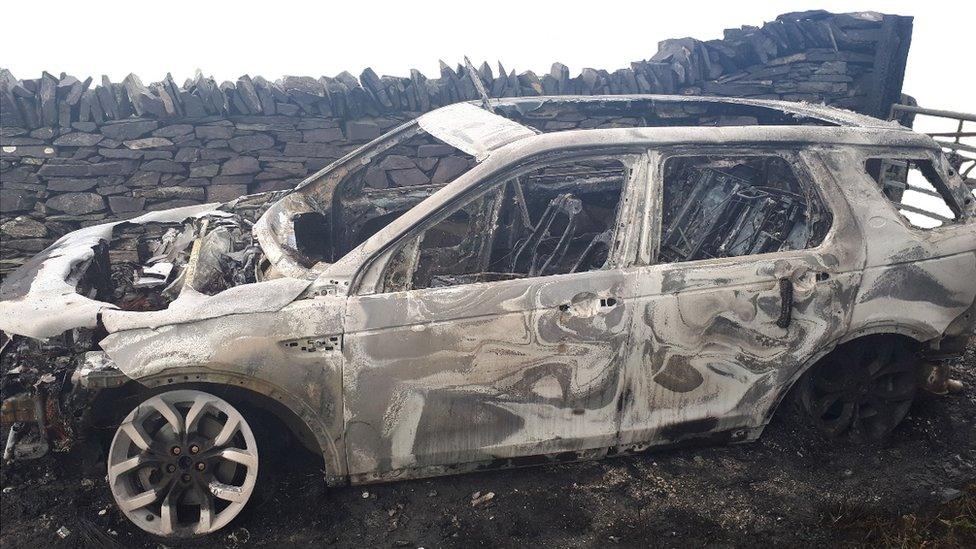
This Land Rover, belonging to Mr Whall's partner, was found burned out on the outskirts of Bangor
Jurors were also told a Land Rover Discovery belonging to Mr Whall's partner - who was away on holiday - had a system which recorded data of its use and showed the vehicle being used in the area for a recce the night before the shooting and then at the time Mr Corrigan was shot.
As well as tracking the car's location, the device also had details such as when the car was locked and unlocked, when a door or the boot was opened and closed, and each time the engine was switched on and off.
The car was found two weeks later burnt out at a disused quarry near Bangor and the defendant said it had been stolen.
While the system was destroyed in the fire, the information about its movements was retained centrally by Jaguar Land Rover.
The court also heard that following the shooting one of the largest suppliers of crossbows contacted police offering to help.
Its director provided a list of 17 people on Anglesey who had bought a crossbow from them within the last 10 years.
A crossbow had been purchased in April 2019 by the defendant, after the date of the shooting, but police - unaware of the delivery date at that stage - went to see him.
Latex gloves, handcuffs and baby oil
He showed police the crossbow he had bought, which had not been used, and made a witness statement where he said he also had another crossbow that he had sold to a stranger who came to his home.
But the jury heard that purchases online showed he had ordered crossbow bolts on 7 April - some two months after claiming he had sold his original crossbow, and almost two weeks before Mr Corrigan was shot.
The bolts were exactly the same sort as the one that killed Mr Corrigan, said the prosecution.
It was "another piece... of the jigsaw" according to Mr Rouch.
In police interview, Mr Whall, of Bryngwran, said he had never met the victim or his partner and on the night of the shooting he was with friend Barrie Williams, who he was having an affair with, the court heard.
He said they travelled to Porthdafach beach car park and engaged in sexual activities in fields nearby.
Mr Rouch said Mr Whall told officers he had opened the car boot - as picked up on the data - to remove a bag containing latex gloves, handcuffs and baby oil.
But Mr Rouch told the jury Mr Williams was likely to tell them he had not seen the defendant that night.
The trial continues.
- Published5 September 2019
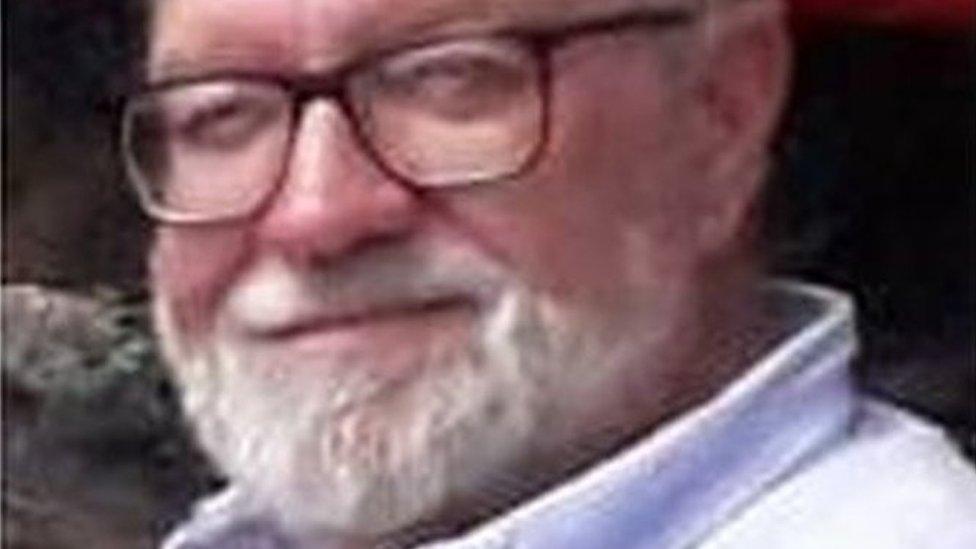
- Published7 August 2019

- Published24 July 2019

- Published23 July 2019

- Published28 June 2019
